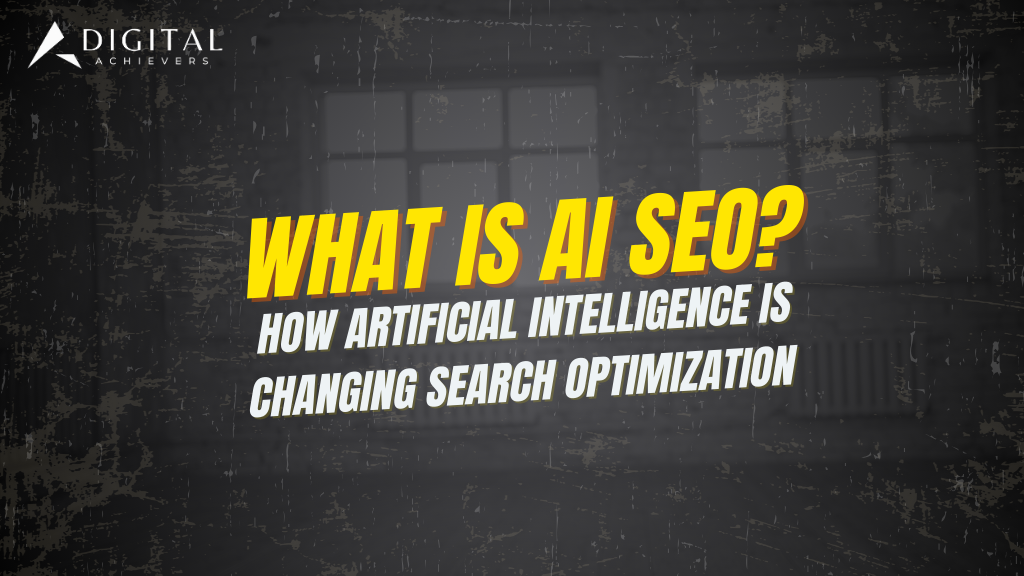What is AI SEO? How Artificial Intelligence is Changing Search Optimization

Search engine optimization (SEO) has always been about adapting to change—whether it’s algorithm updates, shifting user behavior, or new platforms. But one of the biggest transformations happening right now is the integration of artificial intelligence (AI) into SEO strategies. AI isn’t just a buzzword—it’s reshaping how businesses approach content creation, keyword targeting, and ranking strategies.
In this blog, we’ll break down what AI SEO is, why it matters, and how you can leverage it to stay ahead of the competition.
What is AI SEO?
AI SEO refers to the use of artificial intelligence tools, techniques, and algorithms to improve website visibility, organic rankings, and overall performance in search engines. Instead of relying purely on manual research and optimization, AI enables marketers to automate repetitive tasks, analyze massive datasets quickly, and uncover insights that would otherwise take weeks of human effort.
For example, AI-powered SEO platforms can:
- Suggest content ideas based on trending topics and search intent.
- Predict which keywords are most likely to drive traffic.
- Optimize content for readability, engagement, and semantic relevance.
- Monitor competitors’ strategies and identify opportunities.
How AI is Changing Search Optimization
1. Smarter Keyword Research
Traditional keyword research involved looking at search volumes and competition levels. AI tools go deeper—they analyze user intent, semantic relationships, and predictive trends. This means businesses can target not just what people are searching for now, but also anticipate what they’ll search for next.
2. Content Creation & Optimization
AI writing assistants and optimization tools analyze top-ranking content to suggest improvements in structure, tone, readability, and keyword placement. This ensures that your content aligns with both user needs and search engine algorithms.
3. Personalized User Experiences
Search engines like Google increasingly prioritize user experience (UX) signals—bounce rates, dwell time, and click-through rates. AI helps businesses personalize websites, recommending content based on behavior and improving engagement metrics that boost SEO performance.
4. Voice Search & Natural Language Processing
With the rise of voice assistants like Siri and Alexa, AI-driven SEO also involves optimizing for conversational queries. Instead of focusing only on short keywords, businesses must now account for natural, long-tail phrases that mirror spoken language.
5. Advanced Analytics & Forecasting
AI doesn’t just report on what happened—it can predict trends. Marketers can forecast potential traffic changes, identify emerging keywords, and adjust strategies before competitors catch on.
Benefits of AI SEO (Upgraded)
- Faster research, better coverage
Cluster thousands of queries by intent, map them to pages, and uncover topical gaps you’d miss manually → stronger topical authority and clearer site architecture. - Higher-quality content at scale
Use AI to draft outlines, FAQs, and schema while humans add expertise and citations. You get consistent, intent-matched content without sacrificing voice or accuracy. - Smarter on-page optimization
AI suggests headings, internal links, entities, and E-E-A-T signals based on the SERP and your competitors—improving relevance beyond simple keyword stuffing. - Continuous technical hygiene
Automated crawls flag indexation issues, cannibalization, thin pages, and orphaned URLs; AI can also propose fixes (redirects, canonicals, internal link targets). - Personalized experiences that boost UX metrics
AI tailors recommendations, search results, or CTAs by behavior, improving CTR, time on page, and conversions—signals that correlate with better rankings. - Predictive planning & risk reduction
Forecast traffic and seasonality, spot declining pages early, and prioritize updates with the highest expected lift instead of guessing. - Operational efficiency & governance
Standardized briefs, reusable prompt templates, and QA checks (originality, fact-check, bias, tone) remove bottlenecks and reduce rework.
How to Get Started with AI SEO (Practical Roadmap)
0) Set goals & baselines
Define success (e.g., non-brand organic clicks, qualified leads, revenue). Benchmark with GSC/GA4 and a full crawl.
1) Pick 2–3 high-impact use cases to pilot
- Keyword clustering & intent mapping
- Content briefs + outlines for new pages
- Refresh plans for decaying URLs
- Internal link suggestions & anchor optimization
- Structured data (FAQ, HowTo, Product, Article) generation
2) Choose a lean stack (start small)
- Research/briefing: topic clustering, SERP analysis
- Writing/optimization: outline → draft → NLP entities → on-page checks
- Tech & monitoring: crawler + log analysis + alerting
- Analytics: dashboards pulling from GSC/GA4
(You can add specialized tools later; avoid “tool sprawl.”)
3) Build guardrails before you scale
- Style guide + voice rules and a required fact-check step
- Plagiarism/originality scan and citation policy
- Human-in-the-loop sign-off for anything published
- Clear stance on AI disclosure where relevant
4) Run a focused pilot (10–20 URLs)
- 5–10 net-new pages from clusters
- 5–10 refreshes of decaying pages
Track: impressions, clicks, CTR, position, conversions, indexation, and time-to-publish.
5) Instrument measurement
- Page-level tracking sheets (URL → intent → primary/secondary entities → last updated)
- Alerts for rank drops, crawl anomalies, or cannibalization
- Monthly review: winners, underperformers, next experiments
6) Scale & automate
- Promote successful prompts/templates to SOPs
- Batch internal link updates by cluster
- Roll out schema types programmatically
- Expand pilots to additional categories/markets
Final Thoughts
AI SEO is not about replacing humans—it’s about augmenting human creativity and strategy with powerful data-driven insights. By embracing AI tools and methods, businesses can create more relevant content, reach the right audiences, and achieve better rankings in an increasingly competitive search environment.
The future of SEO is already here—and it’s powered by artificial intelligence.
Suggestion url: What is a Sitemap: How to Create One and Submit It
